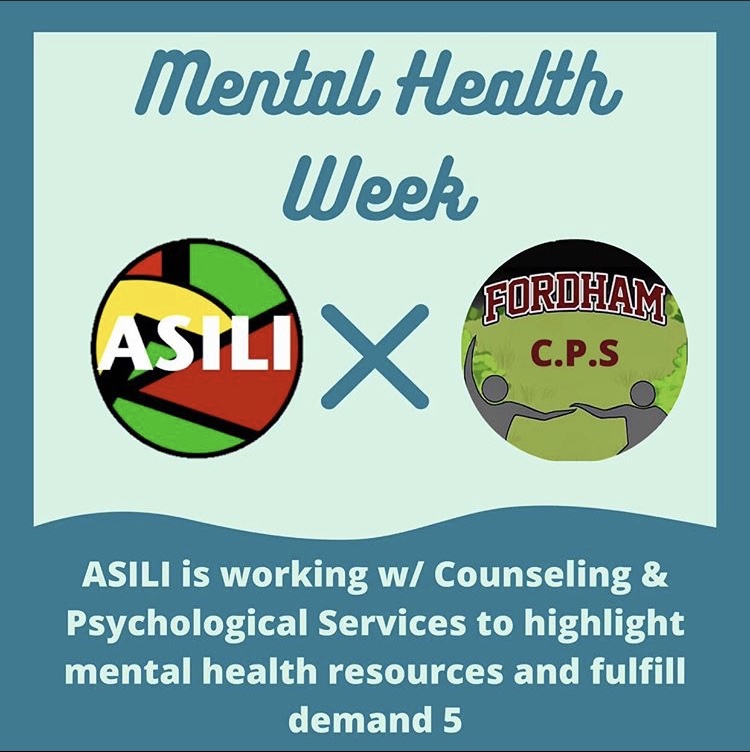ASILI and CPS Discuss Recent Partnership
ASILI, Rose Hill’s Black Student Alliance, announced a partnership with Counseling and Psychological Services (CPS) to highlight mental health resources, according to a post from their Instagram account. This follows the announcement of ASILI’s demands to Fordham University.
“Prioritize Counseling and Psychological Services, especially by ensuring that there are staff specifically trained to handle the needs of marginalized students who seek out services due to feeling unsafe on campus,” read the fifth demand of ASILI’s original list of demands, posted over the summer in response to the events of police brutality and protests surrounding those events.
This comes after CPS faced heavy criticism over the summer on the anonymous Instagram account @letstalkaboutitfordham for a lack of representation and staff equipped with appropriate knowledge of how to effectively support Black students attending a primarily white institution (PWI).
“We wanted to solicit feedback and guidance from ASILI about how we could best support our BIPOC students,” said Jeffrey Ng, Psy.D., director of CPS at Rose Hill, about initiating a relationship with ASILI.
Diontay Santiago, GSB ’21, president of ASILI, commented on the lack of representation at CPS. He recalled that until recently, every Black student he had encountered felt as though the staff at CPS could not relate to them.
“It’s already hard to break the stigma, but it’s more difficult when staff come in with their own separate biases and can’t help even when students do go in,” said Santiago.
Representation within the CPS staff is an important concern as there is a necessary sensitivity that goes along with dealing with certain populations, said Santiago.
“In the Black community there is a large stigma reaching out to psychological services,” said Miranda Rydel, FCRH ’21, vice president of ASILI. “Black students face a lot of stressors non-Black students do not, in addition to the isolation that comes from a lack of representation.”
A partnership with ASILI makes the resources and information from CPS more accessible to Fordham students and helps end the stigma of using these resources, according to Rydel.
Ng said the commitment by CPS to listen and improve their services for BIPOC students led to a collaboration, Mental Health Awareness Week, on ASILI’s Instagram. During this week, one post highlighted some of the counselors of color at CPS, said Ng.
“Marginalized means more than just Black, but marginalized students in general,” said Santiago.
Following ASILI’s first release of demands, CPS reached out in an effort to raise awareness of their existence as a resource for support after the murder of George Floyd, said Santiago. ASILI recently co-sponsored and promoted the CPS facilitated workshop Navigating Police Brutality and Racial Trauma.
“ASILI actively promotes our services, resources and programs with their peers, which is invaluable for normalizing mental/emotional health concerns, self-care/self-preservation and help-seeking, especially in cultures and communities where there may be more stigma and shame around these topics,” said Ng.
Santiago described the recent relationship between CPS and ASILI as “very supportive” in both directions, and Ng described it as “collaborative, respectful, growthful … mutually beneficial/valued.”
“We are committed to engaging in ongoing dialogue with ASILI in order to continuously learn about and respond to the experiences and needs of our BIPOC students,” said Ng.
Mental health resources provided by CPS can be found in ASILI’s Instagram bio or on their website at Counseling and Psychological Services Events.










































































































































































































